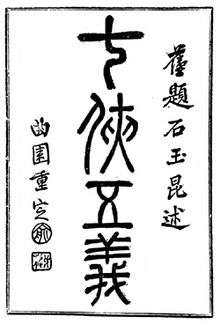Shi Yukun
| Shi Yukun | |||||||||
| Traditional Chinese | 石玉崑 | ||||||||
|---|---|---|---|---|---|---|---|---|---|
| Simplified Chinese | 石玉昆 | ||||||||
| |||||||||
| Shi Zhenzhi | |||||||||
| Chinese | 石振之 | ||||||||
| |||||||||
| Wenzhu Zhuren (possible pen name?) | |||||||||
| Traditional Chinese | 問竹主人 | ||||||||
| Simplified Chinese | 问竹主人 | ||||||||
| Literal meaning | "Bamboo-Inquiring Master" | ||||||||
| |||||||||
Shi Yukun (fl. 19th century), courtesy name Zhenzhi, was a highly popular Beijing-based storyteller during the Qing dynasty. He is credited for creating the 1879 masterwork wuxia novel The Tale of Loyal Heroes and Righteous Gallants (better known today as The Three Heroes and Five Gallants or The Seven Heroes and Five Gallants). While he was famous for performing stories on which the novel was based, whether he actually contributed to the print novel is unknown.[1]
Biography
While eponymous poems and zidishu solely to celebrate (or perhaps mock) Shi Yukun's fame and storytelling skills have survived, little is actually known about his life, besides that he performed his art in the national capital Beijing during the 19th century, probably as early as 1817.[2] While some scholars had believed he was originally from Tianjin, it was probably a mistake made by confusing Shi Yukun and Shi Duo (石鐸), the publisher of the 1891 novel The Five Younger Gallants which also claimed Shi Yukun as its original source.[3] The suggestion that Shi Yukun was ethnic Manchu, based on his surname (common in Manchus) and the Manchu genre of zidishu in his performances,[4] also lacks convincing evidence.[5] He was called "Third Master" (三爺) by at least another storyteller.[6] He was clearly literate.[7]

Style
His performances, accompanied by sanxian (3-stringed lute) playing, would attract audience of thousands.[9] He did not employ a wooden clapper like modern pingshu performers, rather, he uses his musical instrument to call the audience's attention.[10] He was best known for his poetic lyrics and tunes during his songs.[11]
In addition to the story that eventually became The Seven Heroes and Five Gallants, at least 2 other stories have been associated with him:
- Fengbo Pavilion (風波亭, about events after Yue Fei's death)
- Black Rock Mountain (青石山, a supernatural tale featuring fox spirit)
Rare for a public storyteller, he was literate and is believed to be the same person as the one behind the pen name Wenzhu Zhuren ("Bamboo-Inquiring Master"), who first edited the original transcript of his storytelling for publication, which eventually became The Three Heroes and Five Gallants.
The novel's sequels The Five Younger Gallants (小五義), and A Sequel to the Five Younger Gallants (續小五義) claimed him as the author, but as Lu Xun pointed out, "these works were written by many hands... resulting in numerous inconsistencies."[12]
In popular culture
Shi Yukun is a character in two fictitious television costume comedy-dramas, both referencing The Seven Heroes and Five Gallants:
- The Strange Cases of Lord Shih (施公奇案), a 1997 Taiwanese TV series. Case 11, "Odd Happenings in Examination Halls" (考場怪譚), stars Hou Kuan-chun as Shi Yukun, a scholar who despite finishing first in the district civil service examination, went to great lengths to expose cheating. In his escape from persecution, he was helped by 5 chivalrous beggars named Lu Fang, Han Zhang, Xu Qing, Jiang Ping and Bai Yutang—obvious references to the "Five Gallants" in the novel. Historically, considering that Shi Yukun flourished during the 19th century, he could not have been a contemporary of Lord Shih or Shi Shilun (1659–1722).
- Thirteen Sons of Heaven Bridge (天橋十三郎), a 2004 Chinese TV series. The series stars Xu Zheng as Shi Yukun, a scholar who after failing the imperial examination began to perform sanxian-playing and storytelling on Heaven Bridge, the bazzar of street performers in Beijing. Besides him, the title refers to 12 main characters, namely Ding Zhaolan, Ding Zhaohui, Ouyang Chun, Ai Hu, Zhan Zhao, Zhi Hua, Shen Zhongyuan, Lu Fang, Han Zhang, Xu Qing, Jiang Ping, and Bai Yutang–understandably the basis of the "Seven Heroes" and "Five Gallants" in the novel. (Characters named Gongsun Ce, Wang Chao, Ma Han, Zhang Long and Zhao Hu also appear in the series.) Seeing how Shi Yukun, despite his weak body, bravely fought injustice and challenged authorities, lazy, cowardly, and petty-minded individuals were gradually transformed to good men, and in the process, the 13 became close friends. Eventually, many of Shi's friends sacrificed their lives fighting a rebellion, and the series ends with Shi dreaming of their returns in opera costumes, rejoicing wildly at his side.
References
- ↑ Keulemans, p. 28.
- ↑ Keulemans, pp. 65–66.
- ↑ Keulemans, pp. 83 & 88.
- ↑ Blader, p. xxiv.
- ↑ Blader, pp. xv–xvi.
- ↑ Blader, p. xxi.
- ↑ Blader, p. xvii.
- ↑ Keulemans, p. 82.
- ↑ Deng & Wang, p. 13.
- ↑ Keulemans, p. 165.
- ↑ Keulemans, p. 166.
- ↑ Lu Hsun; Yang Hsien-yi (trans.); Gladys Yang (trans.) (1964). A Brief History of Chinese Fiction (2nd ed.). Beijing: Foreign Languages Press. ISBN 1135430608.
- Blader, Susan (1998). Tales of Magistrate Bao and His Valiant Lieutenants: Selections from Sanxia Wuyi. The Chinese University Press. ISBN 962-201-775-4.
- Deng Shaoji; Wang Jun; (trans. Wen Jingen) (1997). "Preface". The Seven Heroes and Five Gallants. Chinese Literature Press. ISBN 7-5071-0358-7.
- Keulemans, Paize (2014). Sound Rising from the Paper: Nineteenth-Century Martial Arts Fiction and the Chinese Acoustic Imagination. Harvard University Asia Center. ISBN 978-0-674-41712-0.